MTV’s new Rock the Vote ad is visually arresting and features an on screen gay couple and a kiss. And it has a nice vibe to it too.
Category Archives: Current Affairs
On Religious Tests for Public Office
The Millennial Memory…
I was going to defer this commentary until after Dan posted his commentary and addenda to the bowdlerized PBS Whitman hagiography which, while it was a nice attempt, proved once again how subtly Gay people and beautiful same sex love can be written out of history…no sin but omission. But I can’t wait…and since we offered Father John McNeill’s views on things, I feel moved to share my own point of view of this…
The Pope is in America…and everyone is so worked up and excited.
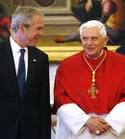 Your first clue that this stinks is George Bush is receiving him at the White House. Church and State, once again, cozy at the highest levels. We live in an age of hypocrisy and perhaps the only way to be able to get out of bed in the morning is to at the very least, call it what it is.
Your first clue that this stinks is George Bush is receiving him at the White House. Church and State, once again, cozy at the highest levels. We live in an age of hypocrisy and perhaps the only way to be able to get out of bed in the morning is to at the very least, call it what it is.
I’m particularly taken with the media coverage of it all that, while reminding folks of the “controversy” — that is corporate media’s Mother’s Milk (ka-ching!) — it still manages to gloss over with what is bewilderingly called “balance” these days, with the moony-eyed musings of the “faithful” contrasted with the last seething furious gasps of the thousands of men and boys who have been molested, as though they have equal merit. And somehow they manage to leave out the part where this Pope, in his former job as head of what was the office of the Inquisition in another time, instructed those in charge…those responsible for protecting children (hello Texas!) …to play it out for time so the statutes of limitations would take effect. Bill Maher nails this one beautifully in his recent “Rules.”
But what I am reminded of as we watch the flash and the dash, the pomp and the circumstance, the gold and the satin, the grandeur and the theater of it all, of the Papacy paraded before us as though this was some moral model, is something I was told when I was, years ago, the Parish Council Chairman of Holy Trinity Parish on the Upper West Side of Manhattan.
One of my closest friends in those days was a Franciscan priest who was living at the parish (not diocesan, in other words). He shall remain nameless here, because he continues to be a priest…a Gay priest, I might add, who loved his cocktails a little too much…and if reports are true, now the Pastor of a parish in one of the bigger primary states. I loved Michael, and still do, even though I haven’t seen him in years, and I would never want to cause him any embarrassment. Michael was a good friend of the “Saint of 9/11” Mychal Judge, and is the reason I meet Father Judge many years ago.
Anyway…probably the most interesting idea Fr. Michael passed along to me was the idea of the “institutional memory” of the Roman Catholic Church. His point was this: the Church views time in a different way than the rest of the hoi polloi.
I was all ready for some mystical take on time and eternity and what-have-you. But no. What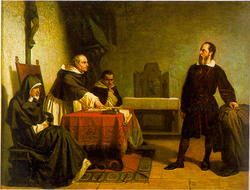 he meant was the Church and its hierarchy view time in a “millennial view.” That was the term he used. A millennial view. The very long millennial view. In other words: these things shall pass. A century from now, who will remember? Who will be around to remember? The Church will still be there, of course, but generations of regular folks come and go…and they die. They forget. All that is remembered after a while, say a generation…maybe two…ok, three… is the flash and the dash, the pomp and the circumstance, the gold and the satin, the grandeur and the theater of it all. So…a hundred years…a mere blink of an eye, if that, to an institution like the Catholic Church…200 years…what is 200 years to an institution that has been around in cozy bed with the powers of the world for 2000 years? The one thing this millennial view affords is priceless: people will forget. Who remembers the Inquisition? Who, nowadays, even cares? Who remembers what was done to American Indians in the name of Christianity?
he meant was the Church and its hierarchy view time in a “millennial view.” That was the term he used. A millennial view. The very long millennial view. In other words: these things shall pass. A century from now, who will remember? Who will be around to remember? The Church will still be there, of course, but generations of regular folks come and go…and they die. They forget. All that is remembered after a while, say a generation…maybe two…ok, three… is the flash and the dash, the pomp and the circumstance, the gold and the satin, the grandeur and the theater of it all. So…a hundred years…a mere blink of an eye, if that, to an institution like the Catholic Church…200 years…what is 200 years to an institution that has been around in cozy bed with the powers of the world for 2000 years? The one thing this millennial view affords is priceless: people will forget. Who remembers the Inquisition? Who, nowadays, even cares? Who remembers what was done to American Indians in the name of Christianity?
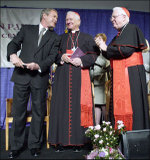 And who…a thousand years from now, will remember the hundreds of thousands of boys who were molested, abused? And how the Church worked not to wash it clean with the cleansing light of day, but to hide it away until the secular laws ran out the clock? How does an institution pull off something like an Inquisition and still maintain the illusion of moral probity? How does an institution pull off something like not only the on-going molestation and abuse of thousands of children, but covering it up and paying people off for years…
And who…a thousand years from now, will remember the hundreds of thousands of boys who were molested, abused? And how the Church worked not to wash it clean with the cleansing light of day, but to hide it away until the secular laws ran out the clock? How does an institution pull off something like an Inquisition and still maintain the illusion of moral probity? How does an institution pull off something like not only the on-going molestation and abuse of thousands of children, but covering it up and paying people off for years…
Sleepy…you’re getting sleepy. Don’t you worry your pretty little head about these matters.
Father will take care of it for you. Rest your head in his satin-covered lap as he bathes you in incense and architecture and unctuous oils and candles…the flash and the dash, the pomp and the circumstance, the gold and the satin, the grandeur and the theater of it all…
And soon you will forget…
Please make this presidential campaign go away…
It’s been a while…a long while…since SNL has been anything even approaching funny much less satirical. But their recent take on the Senate testimony of General Petraeus comes pretty darn close…it’s almost Daily Show-worthy…
On the Occasion of the Pope Coming to Town
Many interesting things come over our transom…this from the esteemed John J. McNeill, on the arrival of Joseph "God’s Rottweiller" Ratzinger (wasn’t this guy on Cheers?) on our shores (traveling under his nom de power "Pope Benedict XVI"):
Toward a Theology of Fallibility
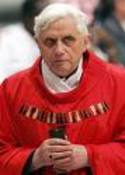 When Pope Benedict comes to Ground Zero in New York City he will be greeted by
When Pope Benedict comes to Ground Zero in New York City he will be greeted by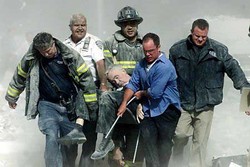 a giant banner with a painting of Michael Judge, the Gay Franciscan priest, whose life is recorded in the documentary, Saint of 9/11. That banner signifies the ambiguous state of many Gay, Lesbian, bisexual and transgendered Catholics toward the Pope. We share the respect and love of the Catholic community for the Vicar of Christ and wish him well. At the same time we are profoundly aware of how wrong he is in his understanding and judgment on Gayness as “intrinsic disorder”. We are deeply conscious that we cannot accept and live out his teaching on homosexuality without destroying our mental and spiritual health. What is bad psychology has to be bad theology. We find ourselves in the same position as children of a homophobic parent, who, while still loving their parent, must separate off and take distance from that parent’s homophobia, if they are to live happy and healthy lives.
a giant banner with a painting of Michael Judge, the Gay Franciscan priest, whose life is recorded in the documentary, Saint of 9/11. That banner signifies the ambiguous state of many Gay, Lesbian, bisexual and transgendered Catholics toward the Pope. We share the respect and love of the Catholic community for the Vicar of Christ and wish him well. At the same time we are profoundly aware of how wrong he is in his understanding and judgment on Gayness as “intrinsic disorder”. We are deeply conscious that we cannot accept and live out his teaching on homosexuality without destroying our mental and spiritual health. What is bad psychology has to be bad theology. We find ourselves in the same position as children of a homophobic parent, who, while still loving their parent, must separate off and take distance from that parent’s homophobia, if they are to live happy and healthy lives.
We Roman Catholic Gays have found it necessary to undergo the same maturing process in our spiritual lives that Jesus asked his disciples to undergo at the last supper. “I shall ask the Father and he will send you another Paraclete to be with you forever, the Spirit of truth.” (John 14: 16-17) Jesus stressed the point that it was necessary that he should go away in order for the Spirit to come. “Yet you are sad at heart because I have told you this. Still, I am telling you the truth; it is for your own good that I am going, because unless I go, the Advocate will not come to you; but if I go. I will send him to you….However, when the Spirit of truth comes, he will lead you to the complete truth.” (John 16: 6-13)
Why could the Spirit of Truth only come after Jesus’ death? Because as long as Jesus remained alive and present, his disciples had their center of authority outside themselves and were not totally responsible for their actions. They were striving to meet the expectations of a provident leader. They had not yet become fully creative and responsible adults. But after Jesus’ death, his Spirit became what Paul saw as the source of the “Glorious Freedom of the Children of God”. “The proof that you are sons and daughters is that God has sent the Spirit of his Son into our hearts: the Spirit that cries, ‘Abba’, Father; and it is this that makes you a son or daughter, you are not a slave anymore’. Pagans were not free but slaves in relation to their gods because they related to their gods in a spirit of fear. John tells us “Perfect love cast out all fear. It is equally true that perfect fear casts out all love.” Christians are free because their God is a God of love who had adopted them into his family. “All who are guided by the Spirit of God are sons or daughters of God, for what you have received was not the spirit of slavery, to bring you back into fear, you have received the Spirit of adoption, enabling us to cry out Abba, Father.” (Rom. 8:14-17)
With the death of Jesus and the coming of the Holy Spirit, the apostles received a challenge as well as an opportunity to mature. As Paul expressed it, “…until we all reach unity in faith and knowledge of the Son of God and form the perfect human, fully mature with the fullness of Christ himself.” (Eph. 4:13). The apostles had to give up the security of a provident leader; they had to begin to find out what God wanted from them from within themselves and their own experience.
In like manner, in our spiritual life, we Roman Catholic Gay people must pass from a passive, dependent role to an active, creative one. For our survival we have a special need to become mature, self-motivated, autonomous people, no longer dependent on outside homophobic sources for a sense of our identity and well-being. We must not let our enemies outside ourselves define us; we must let the Spirit of love that dwells within our hearts define us. As the Catholic philosopher Maurice Blondel expressed it: “Our God dwells within us and the only way we can become one with that God is to become one with our authentic self”.
It is this understanding of the role of the indwelling Holy Spirit that gives me great consolation during these times when the Catholic Church reacts to its Gay members in ignorance and even downright hostility. We Gays should be grateful to God for creating a humanly fallible Church. We are intensely aware that if our parents had been infallible we could never have matured and become autonomous and responsible adults. God blessed us with finite and fallible parents. It was precisely when and where our parents proved fallible that we were challenged to take distance from their authority, make our own choices and be fully responsible for them.
In a similar way, as Gay Roman Catholics we are dependent on the human fallibility of religious authorities in order to develop an adult freedom of conscience. I believe that we are witnessing the coming into being of what I call the Church of the Indwelling of the Holy Spirit. After forty years of ministry with Lesbian and Gay persons, as both priest and psychotherapist, I am convinced that a unique spirituality, special and vibrant, is springing up in the Christian Gay community. It is spirituality totally compatible with a life of Gay sexual love and intimacy. As scripture says “the stone which the builders rejected has become the cornerstone. (Mark 12:18) Gays are leading the way to form a spiritual community based on the indwelling of the Holy Spirit. The Spirit’s special presence in the Gay Christian community and the unique graces which are enabling Lesbians and Gays to build a mature, autonomous spiritual life are not just gifts meant for the Gay Christian community alone. When God pours out special blessings on one segment of the community, those blessings are meant to flow out and be shared by the human community at large.
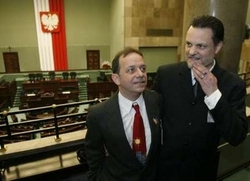 The Church of the Holy Spirit will be a Church in which all are equal, no hierarchy, no clergy as a separate caste, no domination of men over women. Leadership in the Church of the Holy Spirit will be based on careful listening to what the Holy Spirit is saying through the people of God. A recent event makes me believe that God is working overtime to bring about the transformation of the Catholic Church into the Church of the Holy Spirit. President Lech Kaczynski of Poland in a March 17 televised speech to the nation, echoing the Vatican position, warned that the adoption of the European Lisbon Treaty would compel Poland to recognize same-sex marriages, which he linked to the end of “moral order”. To make his point the president used footage of the 2003 wedding of Brendan Fay and Tom Moulton in Canada. As a result of that speech a media frenzy moved Brendan and Tom out of obscurity and they became world famous. Brendan and Tom are devout Gay Roman Catholics who see their marriage as a sacred bond blessed by God. The Holy Spirit is ultimately in charge of the Church and will transform it so that it becomes one with the realm of God. We who are Gay and Catholic pray daily that the hierarchy will hear what the Spirit is saying through the people of God and cooperate with the Spirit’s transformation of the Church.
The Church of the Holy Spirit will be a Church in which all are equal, no hierarchy, no clergy as a separate caste, no domination of men over women. Leadership in the Church of the Holy Spirit will be based on careful listening to what the Holy Spirit is saying through the people of God. A recent event makes me believe that God is working overtime to bring about the transformation of the Catholic Church into the Church of the Holy Spirit. President Lech Kaczynski of Poland in a March 17 televised speech to the nation, echoing the Vatican position, warned that the adoption of the European Lisbon Treaty would compel Poland to recognize same-sex marriages, which he linked to the end of “moral order”. To make his point the president used footage of the 2003 wedding of Brendan Fay and Tom Moulton in Canada. As a result of that speech a media frenzy moved Brendan and Tom out of obscurity and they became world famous. Brendan and Tom are devout Gay Roman Catholics who see their marriage as a sacred bond blessed by God. The Holy Spirit is ultimately in charge of the Church and will transform it so that it becomes one with the realm of God. We who are Gay and Catholic pray daily that the hierarchy will hear what the Spirit is saying through the people of God and cooperate with the Spirit’s transformation of the Church.
John J. McNeill John J. McNeill, author of The Church and The Homosexual, Taking A Chance on God, Freedom, Glorious Freedom, and Both Feet Planted Firmly in Midair. The Reverend McNeill can be reached at jjmcneill@aol.com
Our Long National Nightmare…explained.
Arthur C. Clarke: The Visionary I Knew
By Toby Johnson
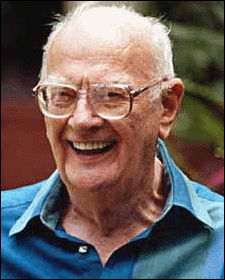 March 18, 2008, at the age of 90, renowned writer and futurologist Arthur C. Clarke passed away. His death made national news in America—of course. His name, arguably, has been one of the most
March 18, 2008, at the age of 90, renowned writer and futurologist Arthur C. Clarke passed away. His death made national news in America—of course. His name, arguably, has been one of the most 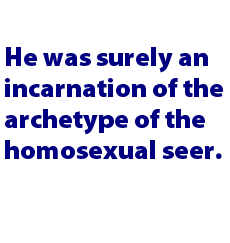 recognizable in the world, if only as creator (with Stanley Kubrick) of the movie 2001: A Space Odyssey. He was a leader in consciousness evolution, an expert on space science, and author of over a hundred books.
recognizable in the world, if only as creator (with Stanley Kubrick) of the movie 2001: A Space Odyssey. He was a leader in consciousness evolution, an expert on space science, and author of over a hundred books.
What won’t be mentioned in most of the news stories, though, is that he was Gay. Of course, that’s using the term inaccurately. He wasn’t a Gay man like the post-Stonewall generation in the U.S., but he was certainly one of us.
Speaking personally, let me report that Clarke had a tremendous influence on me as a young man. I read all his books, emulated his writing style, and even to some extent adopted his post-religious “spiritual” vision of human consciousness. So in the late 1990s, when I learned my friend Kerry O’Quinn, a Gay Austinite and also a science fiction writer, told me he’d met Clarke and carried on a correspondence with him, I jumped at the opportunity to be introduced by mail. I corresponded with Clarke for several years. I wrote about his post-religious spirituality in a couple of my books and cleared my acknowledgement of his sexual identity with him. So I have no qualms 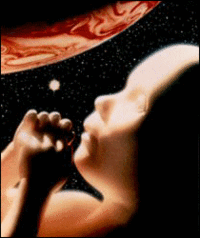 about my including him in the pantheon of homosexual seers.
about my including him in the pantheon of homosexual seers.
An ex-patriate Englishman, Clarke lived most of his adult life as what English society might call a “confirmed bachelor” in an intentional, extended family in the Theravada Buddhist land of Sri Lanka (in fable, the mystical island of Serendip where good fortune and lucky coincidence reign). Though married for a time as a young man, Clarke offered a marvelous example of the contributing, participating life, lived free of the conventions of marriage and childrearing.
He demurred about coming out publicly as Gay, he wrote, because he felt this fact would be used to discredit his ideas. He was 61 at the time of Stonewall, already past the sexual prime in which it’s meaningful to identify oneself as Gay. And, indeed, in 1997, a British tabloid, The Sunday Mirror, ran a story accusing him of having moved to Sri Lanka in order to buy sex from underaged boys, something he found offensive and the accusation distressing. He thought the accusation was really aimed at Prince Charles who was scheduled to knight him—as Sir Arthur—that same year. (At the same time as Sir Elton John, by the way.)
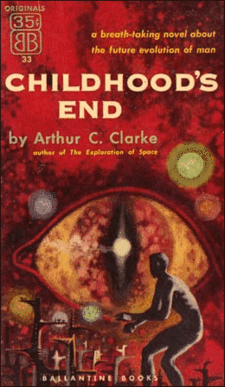 He had a cute quip about not being Gay: "At my age now,” he said, “I’m just a little bit cheerful." He wrote that he was quite fascinated with the role homosexuals have played down through time as revolutionary thinkers. (In our correspondence, he expressed great interest in C.A. Tripp’s book about Abraham Lincoln as Gay.) He kept a private collection of writing which is not to be published until 50 years after his death. I’d wager the world is going to receive the open acknowledgement of his homosexuality and of his theory about gay consciousness as revolutionary come 2058.
He had a cute quip about not being Gay: "At my age now,” he said, “I’m just a little bit cheerful." He wrote that he was quite fascinated with the role homosexuals have played down through time as revolutionary thinkers. (In our correspondence, he expressed great interest in C.A. Tripp’s book about Abraham Lincoln as Gay.) He kept a private collection of writing which is not to be published until 50 years after his death. I’d wager the world is going to receive the open acknowledgement of his homosexuality and of his theory about gay consciousness as revolutionary come 2058.
Science fiction is one of the ways in which the mythmaking function of human consciousness appears today. 2001, with its final psychedelic imagery and apotheosis of astronaut David Bowman into the Star Child, described human consciousness transcending individuality and merging into some sort of greater consciousness, all explained in scientific sounding terms.
In his renowned novel, Childhood’s End, as scientific prophet, Clarke described a planetary progression to a collective mind (in the novel called “the Overmind”) that is foreshadowed by “psychic powers”: telepathy, telekinesis, clairvoyance, and memory of collective, cosmic events. In that sense, one might say he hypothesized such paranormal powers, long elements of religion and mysticism, to be forerunners and hints at humankind’s future evolution.
Even in the 1950s, when Childhood’s End appeared, he called himself an “agnostic Buddhist,” so he probably didn’t believe in a personal afterlife. Still we might imagine that in his dying, Sir Arthur experienced rising into the Overmind.
In his modern/futuristic way, he has surely been a visionary and “Enlightened Being,” a scientifically-minded prophet who had foreseen, and helped bring about, the modern transformation of consciousness. He was surely an incarnation of the archetype of the homosexual seer.
Writer and multiple Lambda Literary Award-winner Toby Johnson was the second publisher of White Crane Journal. He lives in San Antonio, Texas and reviews books for White Crane magazine.
The Passing of a Poet
Jonathan Williams, 79, Avant-garde Poet, Publisher, and Photographer
By Jeffery Beam
Poet, publisher, and photographer Jonathan Chamberlain Williams, founder of The Jargon Society press, one of the most renowned small presses of the last half of the twentieth century, and champion and publisher of some of the most important mid and late century poets in the United States and England, died on March 16, 2008 in Highlands, North Carolina. The cause is not known at this time. Williams, 79, began his avant-garde press while a student at the Chicago Institute of Design, naming it "Jargon" not only for its meaning of personal idiom, but after the French spring pear, "jargonelle" and the French "jargon," meaning the twittering of birds.
The only child of the late Thomas Benjamin and Georgette (Chamberlain) Williams, Williams was born on March 8, 1929 in Asheville, North Carolina, grew up in the District of Columbia and spent summers at the family’s North Carolina mountain home. His father, who designed office systems for government contracts in Washington, grew up in Hendersonville, North Carolina; his mother, a gifted decorator, was the daughter of a successful banker in Atlanta, growing up there and on the ancestral farm near Cartersville, Georgia.
Williams’ interests and talents, revealed him as a Renaissance man – publisher; poet and satirist; book designer; editor; photographer; legendary correspondent; literary, art, and photography critic and collector; early collector and proselytizer of visionary folk art; cultural anthropologist; curmudgeon; happy gardener; resolute walker; and keen and adroit raconteur and gourmand. Williams’ refined decorum and speech, and sartorial style, contrasted sharply, yet pleasingly, with his delight in the bawdy, his incisive humor, and his confidently experimental and inventive poems and prose. His interests, in his own words, raised, "the common to grace," while paying "close attention to the earthy." At the forefront of the avant-garde, and yet possessing a deep appreciation of the traditional, Williams celebrated, rescued, and preserved, as he described it, "more and more away from the High Art of the city" settling "for what I could unearth and respect in the tall grass."
Despite numerous awards and honorary degrees including a Guggenheim, numerous National Endowment Fellowships, and a Longview Foundation Grant, Williams was never sufficiently acknowledged for his achievements as a poet or prose stylist by the writing establishment, nor for his press’s generosity toward artists from all walks of life. His southern Appalachian origins created in him a deep sympathy for the underdog, for society’s throwaways, and for the unbridled creativity of the outsider. He unapologetically celebrated his gay identity long before it was fashionable. By the Reagan years he began to object even more vigorously to the failure of American democracy and education. Williams’ concerns about threats to the natural world; the loss of a humane and well-mannered society; and his distaste for hypocrisy in government, religion and the arts; made for vivid poetry, prose, and conversation, and informed his choices as a publisher. Known for his irascibility and opinions, he once stated (quoting Henry Miller paraphrasing Celine), "one of the things Jargon is devoted to is an attack on urban culture. We piss on it all from a considerable height."
Nevertheless, acclaim came despite the poetry world’s general indifference. Buckminster Fuller once called Williams "our Johnny Appleseed," Guy Davenport described him as a "kind of polytechnic institute," while Hugh Kenner hailed Jargon as "the Custodian of Snowflakes" and Williams as "the truffle-hound of American poetry." Williams held a number of poet-in-residencies early in his career. The Maryland Institute College of the Arts honored him in 1969 with a Doctor of Humane Letters, and in 1974 he received the "Honorable Order of Kentucky Colonels" for services to the arts in Kentucky. Publishers Weekly awarded the press its Carey-Thomas Citation for creative small-press publishing in 1977; in the same year Williams received the North Carolina Award in Fine Arts. Williams joined a handful of other poets to read at the Carter Administration’s White House Poetry Day event in 1980. In 1998 Williams was inducted into the North Carolina Literary Hall of Fame. Distinguished Houghton Mifflin Editor Peter Davison stated in 1990, "a sensible society would set up a permanent outsize subsidy for…Williams and let him go to whatever his hand fell upon…Jargon is still searching out astonishments; it is one of the irreplaceable American small-press institutions."
Williams began his education at Washington’s Cathedral School at St. Albans, entering Princeton in 1947 where he soon found the academic track stifling. He wrote in a 1984 self-interview, "I clearly did not want to become a Byzantinist in the basement of The Morgan Library; or an art critic for The New Yorker; nor did I want to live in the world of competitive business." Escape, much to his parents’ dismay, was inevitable and leaving Princeton in his sophomore year he studied painting at the Washington’s Phillips Gallery with Karl Knaths, later joining Bill Hayter’s Atelier 17 in Greenwich Village to study etching, engraving, and printmaking.
Williams’ interest in photography and bookmaking led him eventually to the Chicago Institute of Design. Here, again, Jonathan found the commercial focus too confining, and his interest in photography deepened. Photographer Harry Callahan, a professor at the school, unable to allow a lower-classman into his seminars, suggested that Williams go to Black Mountain College in the summer of 1951 to study with him and Aaron Siskind. Before leaving for Black Mountain, Williams set off for California to meet with Kenneth Rexroth, Henry Miller, and Kenneth Patchen, all with whom he had been corresponding. Their enthusiasms for the enhancement of words through visual dimensions, and Black Mountain’s principles of learning by doing and the tactile importance of art, were to play an important role in the development of Williams’ aesthetic principles as a poet, photographer, publisher, collector, and critic.
Jargon and Williams came to life at Black Mountain where Williams, under the tutelage of rector poet Charles Olson, began writing more of his own poetry. Olson hired his talented student to be the college publisher. Ultimately Jargon, along with New Directions, Grove, and City Lights became one of the four most famous small presses of a burgeoning 1960s movement that continues not only on the printed page, but today, even on the Internet. Jargon’s books, in particular, became collectibles, setting the standard for the small press, and were widely praised for their meticulous beauty and refined craft, and for Williams’ ability to discover new and important talent. In the late 1950s, the 1960s and 1970s Williams was known for filling his Volkswagen Beetle with books and traversing the country, selling books out of the back seat, giving readings, and spreading the word about the many writers and artists he had come to know.
Writers and artists, nurtured by Jargon, number in the hundreds. Many of their careers began or blossomed under Williams’ and Jargon’s patronship, including American authors James Broughton, Robert Creeley, Guy Davenport, Robert Duncan, Russell Edson, Buckminster Fuller, Ronald Johnson, Denise Levertov, Mina Loy, Paul Metcalf, Lorine Niedecker, Charles Olson, Joel Oppenheimer, and Louis Zukofsky; photographers Lyle Bongé, Elizabeth Matheson, John Menapace, Mark Steinmetz, and Doris Ullman; British poets Basil Bunting, Thomas A. Clark, Simon Cutts, and Ian Hamilton Finlay; and bookmakers Jonathan Greene, Doyle Moore, and Keith Smith. Some of the artists and photographers who contributed visually to Jargon designs include Harry Callahan, John Furnival, David Hockney, R. B. Kitaj, James McGarrell, Ralph Eugene Meatyard, Guy Mendes, Robert Rauschenberg, and Art Sinsabaugh. Thornton Dial, St. EOM, Georgia Blizzard, Howard Finster, Annie Hooper, and James Harold Jennings, are just a few of the visionary folk artists whom Williams began to champion in the 1980s, and whose work is represented in his outstanding personal collection of outsider art, in his essays about visionary art, and his yet unpublished monograph Walks to the Paradise Garden. One Jargon title, Ernie Matthew Mickler’s White Trash Cooking, took America by storm appearing on the New York Times bestseller list, with major interviews and reviews in the national media, standing alone as the book which temporarily made Jargon a household name.
The Jargon Society archives, containing personal papers as well as press materials, rest at the Poetry/Rare Books Collection‒SUNY at Buffalo. Williams’ correspondents were legion. In his letters, no less than in his poetry and essays, Williams—who was known to write under various noms de plume such as Lord Stodge, Big Enis, Colonel Williams, and Lord Nose—held court, preaching the art gospel with his usual flair. He was fond of quoting Robert Duncan, "Responsibility is to keep the ability to respond." Yale University recently purchased Williams’ personal photographic archive, including his uncommon portraits of poets, painters, writers, and artists – major works documenting Black Mountain College and Williams’ peripatetic wanderings across America and Europe. His letters, negatives, and photographic prints alone will provide bountiful insight into 20th century culture, history, sensibility, and community.
Celebrated as a Black Mountain Poet, Williams’ work argues the primary importance of imagination as a foil to ignorance, and pinpoints ignorance (whether in the arts, civic or personal realms) as the source of cultural blight. As a poet he has been described as a cross between Martial, Socrates, Basho, Tu Fu, and Richard Pryor. Experimental and open in form, the symbiotic relationship between music and poetic composition and the possibilities of beauty found in the high and low, the ribald and the erudite, the metaphysical and the concrete, set his writing apart as audaciously original. Oftentimes expressed through word-play, found poems, paeans to pastoral significance, and rails against contemporary despoliation, the poems and essays draw on a wide range of subjects and themes including politics; jokes; local speech and customs; classical music and jazz; and visionary, photographic, and abstract art. In them Mahler, Bruckner, Delius, Ives, Satie, Samuel Palmer, and William Blake commune with Mae West, Jelly Roll Morton, Thelonius Monk, Frederick Sommer, and Richard Diebenkorn. Articulated through an unconventional synesthetic panache, commanding musical economy, and vinegary wit, they demand attention to, rather than carelessness toward, ecological guardianship of the arts, nature, and local traditions. His works of local speech equally capture the unpretentious nuances of country vernacular and the refinement of the “aristocracy,” as well as the sometimes dumb misapprehensions of each.
Williams’ over one hundred works, published by many of the most important small presses in this country and Britain, exemplified his playful blend of polish and earthiness, and revealed his massive and impressive circle of friends. Williams seems to have known practically everyone of consequence in early and mid-twentieth century American alternative arts. An Ear In Bartram’s Tree (1969, University of North Carolina) and Blues & Roots/Rue & Bluets (1971, Grossman; 1985, Duke University) demonstrate his sensitivity to the nuances of language and the simple charms of Appalachian and White Trash culture. Quote, Unquote (1989, Ten Speed Press) was one of many editions of Williams’ astonishing accumulations of revelatory quotations discovered in his wide reading. A Palpable Elysium: Portraits of Genius and Solitude (2002, David Godine) offers a select view of Williams’ photographs of unique people and places accompanied by pithy, revealing mini-essays. The Magpie’s Bagpipe (1982, North Point) and Blackbird Dust (2000, Turtle Point) collect spicy essays on artists and culture. Jubilant Thicket: New and Selected Poems (2005, Copper Canyon) contains a selection of over 1000 of Williams’ poems.
Williams and his partner of forty years, Poet Thomas Meyer, lived since the early 1970s in a seventeenth century shepherd’s cottage in the English Cumbrian hills in the summer and at the Scaly Mountain home near Highlands in the winter. For the past decade they have resided mostly at Skywinding Farm, in Scaly. Williams is survived by Meyer, their beloved ginger-cat H-B, and numerous devoted friends and supporters. In the Appalachian poem "Epitaphs for Two Neighbors in Macon County No Poet Could Forget" Williams captures Uncle Iv Owens. It seems a fitting epitaph, too, for this remarkable man of American letters, Jonathan Williams:
he done
what he could
when he got round
to it
Asylum….NOW!
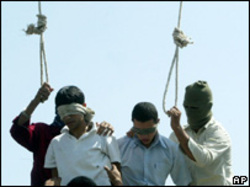 The Netherlands’ highest court on Tuesday rejected a Gay Iranian’s last-ditch appeal to avoid deportation to Britain, where he fears authorities will send him back to Tehran and possible execution.
The Netherlands’ highest court on Tuesday rejected a Gay Iranian’s last-ditch appeal to avoid deportation to Britain, where he fears authorities will send him back to Tehran and possible execution.
Mehdi Kazemi, 19, traveled to Britain to study in 2005 and applied there for asylum after learning that his male lover in Iran had been executed for sodomy. After British authorities rejected Kazemi’s application, he fled and applied for asylum in the Netherlands.
Upholding a ruling by the Dutch government, the Council of State said Britain is responsible for Kazemi’s case because he applied for asylum there first. European Union rules say the member state where an asylum seeker first enters the bloc is responsible for processing that person’s claim.
"There should be some political leadership," he said in an interview. "I hope in Britain they will do it, and otherwise we should take the boy."
Because of Iran’s persecution of Gays, the Netherlands typically relaxes its tough asylum rules when considering applications by Gay Iranians — virtually guaranteeing asylum to any who apply here. However, because Kazemi had already applied for asylum in Britain and been rejected, the Dutch government refused to consider his case, insisting he return to Britain.
Britain’s Home Office has declined comment, saying it does not discuss individual asylum applications.
However, Britain’s Border and Immigration Agency has issued a statement that could give Kazemi hope: "We examine with great care each individual case before removal and we will not remove anyone who we believe is at risk on their return."
Beebo Is Back!
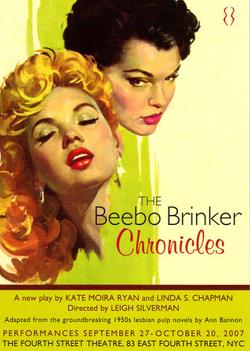 BEEBO BRINKER!…in the form of the Beebo Brinker Chronicles, a wonderfully realized play by Kate Moira Ryan and Linda Chapman based on the estimable Ann Bannon‘s series of books (who. by the by, will be honored along with Malcolm Boyd and Mark Thompson at the Lammies this May in Los Angeles) …IS BACK!
BEEBO BRINKER!…in the form of the Beebo Brinker Chronicles, a wonderfully realized play by Kate Moira Ryan and Linda Chapman based on the estimable Ann Bannon‘s series of books (who. by the by, will be honored along with Malcolm Boyd and Mark Thompson at the Lammies this May in Los Angeles) …IS BACK!
That’s the good news. The bad news is it’s only around for ten weeks and this time it is live on stage at the 37 Arts Theater, 450 West 37th Street. Tickets are available here. Or you can call 212-307-4100 from 9:00 am to 5:00 pm.
This is a delicious evening of theater and LGBT history all rolled into fantastic performances and beautiful bodies. 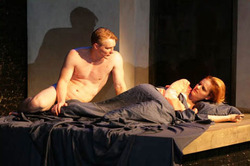 It’s sexy smart and fun. You may recall we wrote about this when we first saw it last October. Since then it’s been nominated for a GLAAD award.
It’s sexy smart and fun. You may recall we wrote about this when we first saw it last October. Since then it’s been nominated for a GLAAD award.
All I can say is…nothing’s changed…it’s just gotten better!
